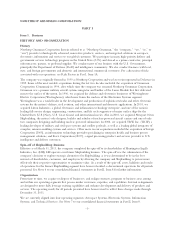Northrop Grumman 2011 Annual Report Download - page 21
Download and view the complete annual report
Please find page 21 of the 2011 Northrop Grumman annual report below. You can navigate through the pages in the report by either clicking on the pages listed below, or by using the keyword search tool below to find specific information within the annual report.NORTHROP GRUMMAN CORPORATION
Standards, Federal Acquisition Regulation (FAR), the International Traffic in Arms Regulations promulgated
under the Arms Export Control Act, the Close the Contractor Fraud Loophole Act and the Foreign Corrupt
Practices Act. If we are found to have violated the law, or are found not to have acted responsibly as defined
by the law, we may be subject to reductions of the value of contracts, contract modifications or termination
and the assessment of penalties, fines, or compensatory or treble damages, which could have a material adverse
effect on our financial position, results of operations, or cash flows. Such matters could also result in suspension
or debarment. Given our dependence on government contracting and authorizations, suspension or debarment
could have a material adverse effect on our financial position, results of operations, or cash flows.
䡲Changes to business practices for U.S. government contractors could have a significant adverse effect on current
programs, potential new awards and the processes by which procurements are awarded and managed.
Our industry has experienced, and we expect it will continue to experience, significant changes to business
practices as a result of an increased focus on affordability, efficiencies, and recovery of costs, among other
items, and a reprioritization of available defense funds to key areas for future defense spending. For example,
the DoD’s Better Buying Power Initiative is designed to reduce costs, gain efficiencies, refocus priorities and
enhance business practices used by the DoD, including those used to procure goods, services and solutions
from defense contractors. In addition, the DCAA has implemented cost recovery initiatives designed to
prioritize efforts to recover costs and close open audits. More recently, the thresholds for certain allowable
costs are being challenged and refined.
These new initiatives have had, and we expect them to continue to have, a significant impact on the
contracting environment in which we do business. In support of the implementation of the Better Buying
Power initiative, the U.S. Government is issuing a large number of new regulations and statutory requirements
which are shifting additional responsibility and performance risks to the contractor. This is also being
accomplished by the Government’s increased reliance on the use of fixed price incentive contracts with
specifically identified fee share line structures rather than cost type or fixed price contracts. While the full
impact to our business as a result of these changes remains uncertain, and subject to the manner in which they
are implemented, our business and industry could be materially adversely affected.
䡲Competition within our markets and an increase in bid protests may reduce our revenues and market share.
We operate in highly competitive markets and our competitors may have more extensive or more specialized
engineering, manufacturing and marketing capabilities or be able to assume lower costs than we do in some
areas or programs. We have seen, and anticipate that we will continue to see, increased competition in some of
our core markets, especially as a result of the reduction in budgets for many U.S. Government agencies and
fewer new program starts. In addition, as discussed in more detail above, projected U.S. defense spending
levels for periods beyond the near-term are uncertain and difficult to predict. Changes in U.S. defense
spending may limit certain future market opportunities. We are also facing increasing competition in our
domestic and international markets from foreign and multinational firms. Additionally, some customers,
including the DoD, may turn to commercial contractors, rather than traditional defense contractors, for
information technology and other support work. If we are unable to continue to compete successfully against
our current or future competitors, we may experience declines in revenues and market share, which could
negatively impact our financial position, results of operations, or cash flows.
We are also experiencing an increasing number of bid protests from unsuccessful bidders on new program
awards. Bid protests could result in the award decision being overturned, and a re-bid of the contract. Even
where a bid protest does not result in a new award, the resolution can extend the time until the contract
activity can begin, and delay potential earnings.
䡲Our future success depends, in part, on our ability to develop new products and new technologies and maintain
technologies, facilities, equipment and a qualified workforce to meet the needs of current and future customers.
Many of the markets in which we operate are characterized by rapidly changing technologies. The product,
program and service needs of our customers change and evolve regularly. Our success in the competitive
-11-
























